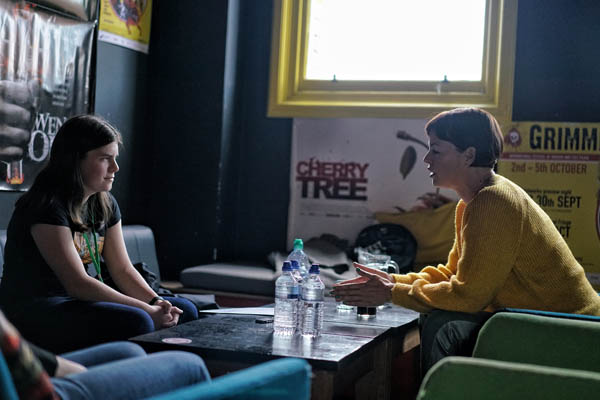
Last year at Grimmfest 2019 film festival in Manchester, I had the great fortune to sit down with actress Pollyanna McIntosh to discuss her directorial debut feature film, DARLIN’ – the third film in the Offspring and The Woman series – which sees a DVD and digital release in the UK on 22nd June 2020.
We also talked about her physical transformations required by the films and TV programmes she’s starred in, as well as how a certain Bruce Robertson didn’t quite live up to expectations…
HCF: You’ve worked quite a lot in the horror genre. Do you enjoy watching horror movies yourself?
Pollyanna: Yeah, totally. It’s not something that I was raised with, particularly, and my parents were strict about what movies I watched. But I’d go over to mates’ houses, whose parents were a little bit more… [laughs]…forgiving, and I’d watch all sorts of awful things. I remember watching The Shining when I was quite young and I was always so affected by it. I couldn’t sleep, you know.
It is a brilliant film. I think because it starts off quite straight and slowly descends into madness, that simmering, isolated uneasiness…
The tension…Ooof!
Yeah! It still gives me the creeps that movie.
I still have to check behind the shower curtain if I go into a different place in case that lady is behind there.
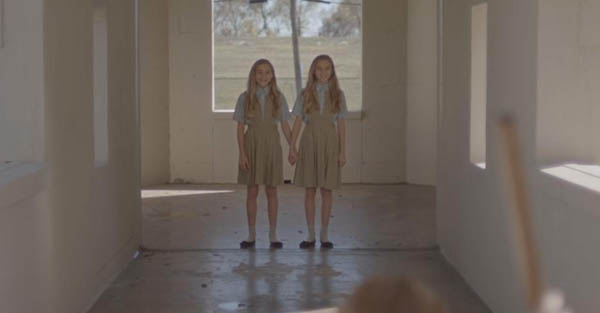
I think with those sort of movies, they’re the most effective ones; films you can watch again and again, and they still frighten you. I mean, I love a Freddy Krueger film but it’s not got the same fear factor as something like The Shining has. But anyway, enough about that – let’s talk about your movie!
What motivated you into wanting to direct?
Well, it’s funny. Before this film, I’d made a 35 minute short called Perfect, which was kind of a dark comedy; a very different world. I hope to finish that as a feature. I’d written the script and wanted to do a proof of concept and ended up with 35 minutes as the first act of it. Before that, when I graduated from uni, I directed and produced a lot of theatre and loved doing that and found that it was the first time that, instead of being a cog in a wheel, I was driving the bus kind of thing. I just adored it, you know? And then, of course, having made so many movies as an actor, it took me a while before I felt like “okay, I’m allowed now to direct”. I have so much respect for what that means and that job. I know people pay a fortune to go to film school and do all this stuff, but after over 35 movies, I finally thought I’ve been watching, I’ve been learning and I felt very ready for it. I was excited.
So I’d already made Perfect and then Lucky McKee suggested to our producer, Andrew van den Houten, that he ask me to direct the sequel, which was a great honour. And I thought, “bloody hell, that’s a hell of a thing to take on”, but, of course, I was very excited about it. However, I really wanted to write it so that it was both personal and something I could live with for a couple years (the average lifetime of script through to post production) and so that it would come from someone’s head that really knew this world and could pay homage to what Jack Ketchum created in the first place, with Offspring, and as it went forward from there. So I said, “Yeah, well, that’s a lovely offer. Thanks very much. But can I also write it please?” The producer went to think about it. And again, Lucky said to him, “Of course, she should bloody write it! She knows the world better than anyone”. So he came back and said, “Yeah, you can write it”. And that was just a delight.
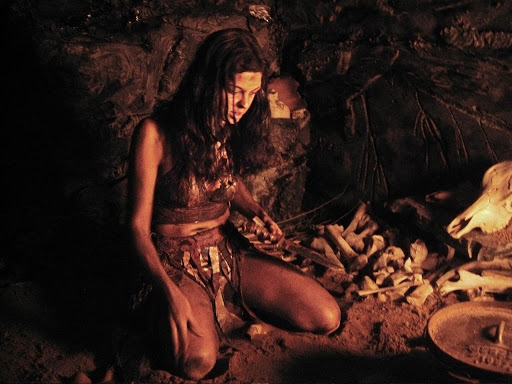
How did you get involved with Offspring in the first place? How did that come about?
So the first audition that I ever had in the States was for a movie called Headspace, a horror movie, and I got it. I was thrilled. It was Andrew van den Houten directing and producing it. It was his first movie out of Emerson and I spent the whole time just watching him, talking to him about what he was doing and watching dailies and everything. Then he cast me in Offspring. He just said, “Can you read this book?” I’m like, “Oh, okay”. I thought, I hope there’s an offer coming or an offer to audition. So I read Offspring, which was the first Ketchum book I’d ever read, and absolutely loved it. I felt so under the skin of this character and called Andrew and said, “Could I be so lucky to be thinking that you might be thinking of me for The Woman in Offspring?” And he said, “Yeah”. I was in London at the time, and I was going to put something on tape and he just said, “No, I know you can do it. You’ve got the role.” That was the first time that ever happened. So I played her (The Woman) in Offspring. She dies in the book and she should have died in the film. Well, she would have died in the film had we stuck to the script but instead, halfway through the film, Andrew said, “You’re having a bit too much fun doing this. I think we should make a sequel. So we want to keep you alive.” I thought, ”Bloody hell! Let us get through this one first!” [laughs]
Then he approached Lucky, because he loved Lucky’s work, obviously, and he asked him if he would like to direct the sequel, taking my character beyond what was in the novels and Lucky co-wrote the film with Ketchum. So that’s how The Woman happened and it was written for me to play her again in. It’s just this beautiful world, you know, that I both loved being involved in and also had people in it that have been very generous with me. It felt great to get to do this (write and direct Darlin’) after all of what came before.
So did Lucky or Jack have any input in Darlin’ from a story perspective or were you given free-reign to write it by yourself?
Both of them are real supporters of artists and they’re really supportive of other people’s work. When I finished the first draft and sent it to Lucky to have a read of it, he said, “Great, keep going”. I said, “Do you have any notes for me?”. He said “No. Just carry on.” It’s the first draft, you know what it’s like, so I said, “Lucky, seriously mate, can you just give me something?” and he’s like, “Well, maybe put a bit more of The Woman in”, because I kind of sidelined her character in order that I could be directing on set and not have to be in front of the camera so much as behind because I wanted to make sure that we made it the best we could. I knew it would be a short, tight schedule, tight budget, and so if you can’t watch back your own stuff necessarily in the time that you have… I just wanted to do it justice and Darlin’ seemed like the most obvious character to take from the previous film and put at the centre. At first I thought I would take Peggy, the teenage daughter from The Woman but I really felt that Darlin’ had so much heart in The Woman and she was so “young and innocent” in the movie. But she had this real strength and real heart to her and this humour to her, and she loved music. I just thought, “She’s somebody I want to see grow up”. What if she’d been in the woods for 10 years and now here she was…? What if I took her back into civilisation? What would that be like for her? If she was raised by a family up to the age of five or six and then she was raised in the woods for ten years, you know? So that really was his only note, to bring a bit more of The Woman and see more of her. I think that was a really good choice because of course fans of the previous film would want to see more of The Woman as well.
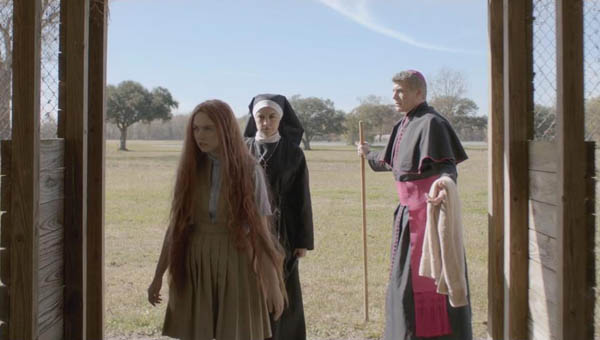
As far as Ketchum was concerned when he read the treatment… First off, you know the concept that I offered up first of how I wanted to make it and how the story would go? He said, “Well, you know, I don’t write about religion. And everyone knows I don’t write about religion. And I don’t think you should put religion in there. I think it just gives it too much power. It’s irrelevant these days anyway.”
I had a very heartfelt conversation with him. I said, “It’s relevant to me and it’s relevant for these reasons, because the same patriarchal system within religion is the same patriarchal system that we live in day-to-day, whether we have anything to do with religion or not. I mean, absolutely, it’s what our culture is built on. It’s a magnification of the injustices in the world that already are doing a disservice to women especially. And you write about that and you write about true horror – this is my true horror. And though I love and respect you, you know, this is me writing it, but I do want your blessing. I hope I have it.”
And it worked. He understood. He said, “I see what you’re saying. Go for it, with my blessing.” So that was lovely.
I noticed that in Offspring, there’s the possessive estranged husband who treats women like objects and even enjoys watching his wife being maimed. This is followed by the sadistic, control freak father in The Woman who likes to appear to the outside world as a wholesome family man. Then with Darlin’, the church is involved, led once again by a corrupt male in an overwhelming position of power. I can see the theme throughout the series of the patriarchy oppressing women…
It’s funny because (Chris) Cleek in The Woman actually says to the teacher, Miss Raton, just before things go really bat-shit, that he feels that she’s accusing him of exactly what he has done. He says, “You don’t think that I would want to miss out on Heaven, do you?” So, for me, there was Darlin’, raised in a world where religion was understood and God was a factor. It wasn’t that there was no religion in there. And inherently, if you’re going to talk about the kind of country lawyer who’s respected in the town in the Midwest, you’re going to have a God-fearing population to some degree. Also I felt it was also absolutely irresistible that we’re dealing with cannibals here and holy communion involves eating the body of Christ. How could you miss out on that?!
What were you looking for in the role of Darlin’ and how did you come across Lauryn (Canny) for the role?
Well, I was looking for a very difficult thing. I was looking for a young actor who could lead a film, who would be brilliant to work with, super collaborative and be able to take the strain and pressure of the kind of shoot that indie films are these days. I hoped for somebody who had a sense of humour and all that jazz. Those were the difficult parts. There had to be a great actor who could play somebody feral and have a huge arc and change in their character throughout the film. They had to be very physically expressive and had to be technically accurate and we’d have to believe her ferality and also feel protective of her so we had to love her. They’d have to have red hair, pale skin and speak with a slight American accent, when she did speak. I found this pale Irish lass with jet black hair, who came to the audition. First one, actually, who came in. Of course, I’d researched, looking through different actors that the casting director was offering and went “yes” or “no”, but I knew that she would probably suit red hair. That was check one. She was totally down to earth and so cool when I spoke to her before the audition, and I just thought, “Oh, God, please be as great in the room as an actor as you are as a person because I already love you and I really want you to be great”. And thank God, she was. She was incredible. We saw a bunch of other people after her because auditions had been set up, but I just knew it was her. I just knew from the start. She killed it in the room.
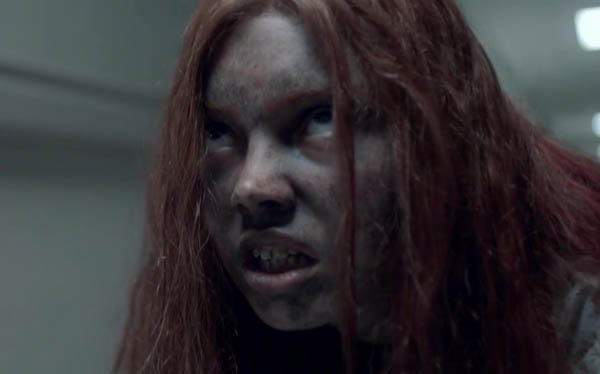
The tone of The Woman was quite dark. How does your movie differ in comparison?
Well, I think there’s obviously going to be darkness with the subject matter that we’re dealing with. I think it’s really true horror in the sense that she’s going through a great personal struggle that is very dark and difficult for her. She’s also in a very oppressive situation. I wanted to show what it’s like when you’re dealing with a bunch of young girls in a Catholic care home who are under an abusive situation. I’ve worked a lot in jails with young offenders. I’ve worked in halfway homes with foster care kids. The humour is what saves their asses in there and the connections that they make because it’s like a sense of found family. I just wanted to show that kind of hope in youth, especially with dealing with the subject matter of heavy patriarchal society, especially being in America, as well, at the time I was writing it and having lived there for a long time. I wanted to show that hope in the youth. So they’re funny, they’re dark humoured, there is gallows humour; I’m from Scotland, that’s totally what my vibe is. So there’s a lot of humour in it too. I wanted to ensure that it was something that both allowed the audience to breathe in between, but also to connect, because if you don’t care about the characters, what do you care when awful things happen? So it’s both my natural inclination to write comedy in anything I’m writing but also I felt that it served the darkness in the film as well. It was also a homage to The Woman because I think there’s plenty of wit in The Woman as well. You know, unexpected humour in unexpected places, which is really fun for me.
I think the film differs in the sense that there’s a lot of pastel colours used here. There’s a sort of infantilisation of the girls going on so I use a lot of light pinks, yellows and light blues, a lot of pastel colours, and then injected this red whenever there was a danger moment or a kill about to happen, so there’s a little red warning sign coming up. That was a lot more saturated, but a lot of the film is kind of creamy and pastel, again, for the infantilisation of the girls, but also for this sort of hope in them as well. I was very influenced by 70’s movies for the look, like Three Women and Picnic at Hanging Rock. So yeah, it’s different. It’s a different world and it requires a different look than The Woman but again, I wanted to bring The Woman fans coming to it the same sense of The Woman that they knew from the previous two films. So in her moment, she’s in the city, she’s gritty, it’s oily, it’s dirty, it’s browns. I kind of see it as a bit of a mix between the look of like Three Women and First Blood, that Stallone movie, or Terminator. I like those two.
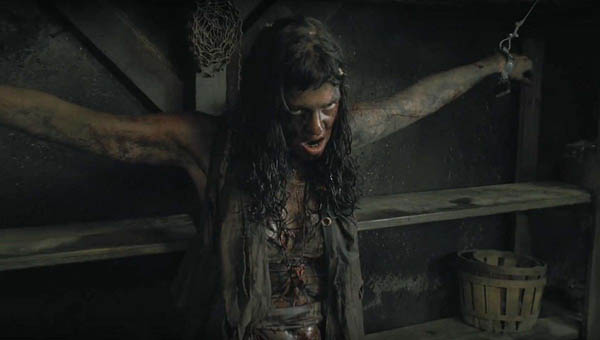
In Offspring, they’re travelling savages and in a way, the woman is travelling – each movie is a different setting. It evolves and she’s evolving. How do you see that the character of the woman has changed from then to now?
I hope if a film is made in the future, if the series continues, that she will always be the way that I’ve seen her to be. She’s got this incredible animal instinct to survive and she’s very strong, and I think she’ll continue to be that way. I think she’s been that way throughout the whole series, but she’s older in this one. In the first one, she had her her clan and she’s looking to expand it. She lost her entire family at the end of Offspring. That’s going to change a person but it also makes her all the more determined. In The Woman, she’s in captivity and she’s completely controlled by Cleek, by Christopher Cleek in the film. But again, she’s got her animal instinct- “How am I going to get out? What are you doing? What’s your weakness? Weak spot?” You know, testing and checking everybody. In Darlin’, she’s got more to lose again, because she now has this ward that she’s raised and looked after and she’s hell bent on getting her back because she loses her early on in the film. So she’s the single minded killer as she always has been but it was important to me that she didn’t kind of kill in the way that a writer is making her kill. I didn’t want her to be just killing men, you know, killing the bad guys. That’s just boring and asinine to me when you impinge on a character with the way that you want the moral story to play out or want to tell that kind of thing. I don’t want to give away too much, however, she’s not always killing the bad guys but she’s always killing for a reason, and sometimes that reason is ’cause she’s hungry.
[both laugh]
I think I’d kill as well for that.
Yeah, we all would actually [laughs]
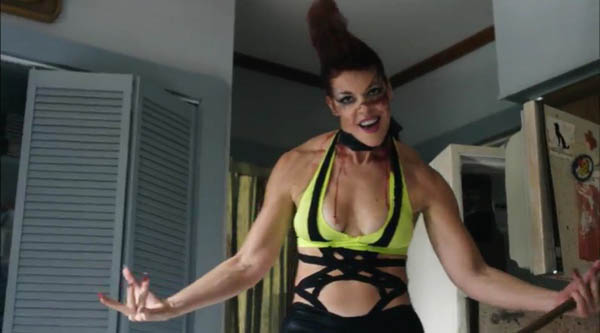
Do you enjoy the physical transformation required for roles? For instance, as Angel in Hap and Leonard. You were looking hench in that… those traps!
[laughs] Mate, I had seven weeks to prepare for that. I promised them, yes, I can build that much muscle. It was so fun. I haven’t eaten so much in my life for preparation for that role. I worked out like mad. I lifted a lot. It was so much fun. Yeah, it was a joy.
I know when you first came on screen and I thought, “Jesus Christ”
[laughs]
At the time, I thought, I need to speak to you to find out what you’d been doing.
Yeah, I’ll get you on a regimen of weight lifting
Please do! 🙂
So obviously you’ve tackled the physical transformation in Hap and Leonard, but also utilising makeup, costume and overall appearance like when playing a savage in The Woman. Is that something you enjoy?
Yeah, I was gonna say I think every actor does but then I remember working with a guy on a movie who absolutely hated that sticky blood stuff. He just couldn’t stand it because your skin sticks to it so you’re you’re always ripping your hair off. So maybe not everyone does like to be covered in crap. But you don’t get into acting to play the same role over and over. I just absolutely love all that stuff and I’ll often be sat in the chair for makeup grinning with the brown and yellow and black – the teeth dirtying. It’s kind of like a nail varnish and you need to dry it. So I’d be like [blowing] with my teeth and sitting there with the hairdryer on my teeth whilst I’m looking at the schedule for the day. They’re putting the wig on and there’s just so much crap all over my face and body. It’s just hilarious and fun.
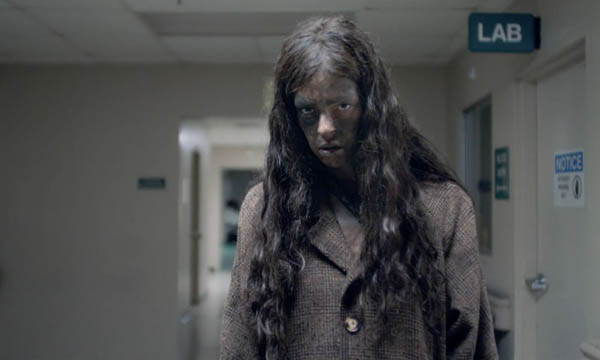
Does it take a long time to do the makeup?
It does take a while and it always speeds up at a certain point, when the work gets going. I think that was one of the biggest challenges with this film was the amount of time that makeup takes for The Woman. I need to be in there as director before the crew call, so that meant that the makeup would have to come in earlier and I didn’t want them to do that because then it would break their turnaround. So on occasion I did the makeup myself so that I didn’t have to make them overwork. It was a very tight schedule. We started off with 24 days. We got a third of our budget cut a week before we started shooting, so we ended up with 20 days schedule at the end. So there were times when I was sticking on the fake, pointy toenails, just to get it done.
Do you feel you put in a better performance in roles where you physically become that character?
I like to think I could do the same job however I’m looking but I tell you this much. There’s a huge freedom in playing that character because you drop societal expectations of what it is to be female; you get to be loud, you get to be violent, you get to be angry. You get to be in control. You get to widen your stance and let your hips fall the way they would fall if you were walking in the woods. She doesn’t have any of the expectations that we have in society, to be nice and good, and those were the themes that I was really exploring with Darlin’s character and what she goes through in it as well. It’s the idea that girls are to be good, quiet and nice, so playing The Woman was like “YEAHHH!! BRING IT ON!”
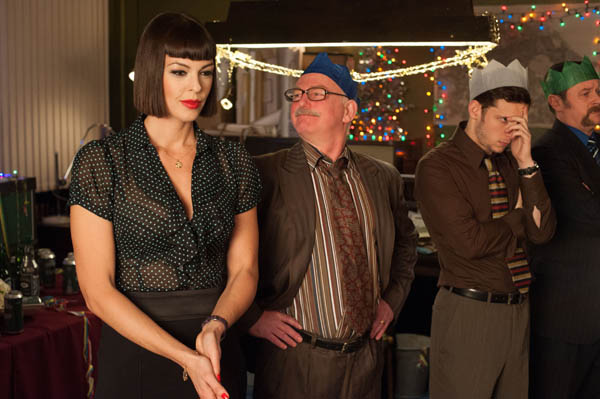
I’ve got one last question – it’s a bit cheeky! In the movie Filth, it was clear that Bruce Robertson was not as well-endowed as he let on…
He’s a brave man, that James McAvoy!
So if not a horse’s, what was it more akin to?
Well, there’s a scene in Filth… The flip side of that scene, you know that?
No
Okay, so there’s the scene that everyone seems to remember of me in Filth – the one where we’re having that very unsatisfying shag for her from behind in the stock room of the police station. And she says, “Fuck me with that horse’s cock”. Well, there’s a scene that happens later when his world’s falling apart and he’s sort of having this dream sequence. I flew all the way to Sweden just to do this. Brian McCardie is sat on top of him dressed as dead Hitler, shagging him, in this dream sequence, and then he climbs off. I climb on and say, “Fuck me with that mouse’s cock”, right? So the film answers the question for you – it’s not cheeky at all.
That’s in the film?
Yeah, he’s having this awful time because he’s going through all those drugs, depression and the whole thing. He’s in his own house, and everyone he’s had anything to do with is suddenly fucking him on the sofa and I’m one of them saying, “Fuck me with that mouse’s cock” [laughs]
You know what, I’m gonna watch it again. I completely missed that bit. I can’t believe I can’t remember that.
A tiny, little, silky mouse’s cock. [laughs]
[laughs] Thank you very much, Pollyanna.
You’re welcome. [laughs] It’s a nice way to end an interview!
DARLIN’ is available in the UK on digital and DVD on 22nd June 2020 from High Flier Films.
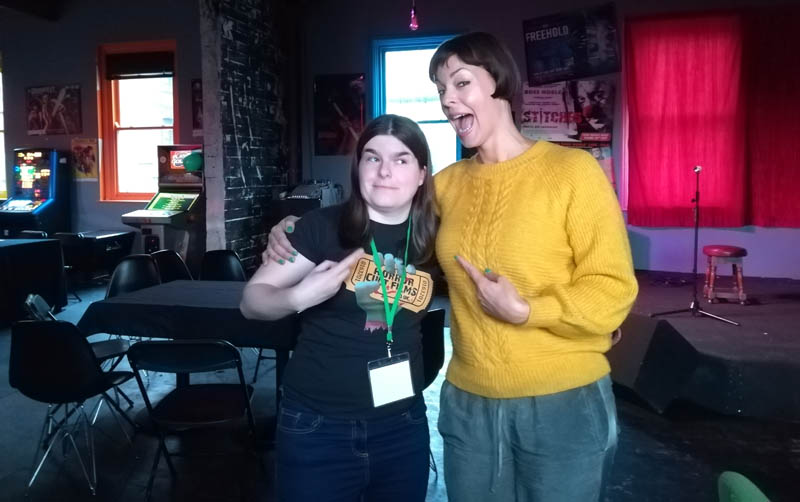

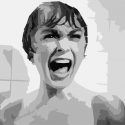
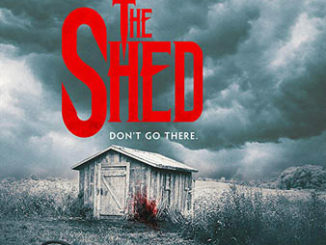
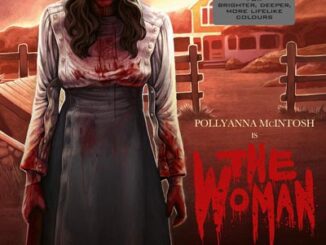
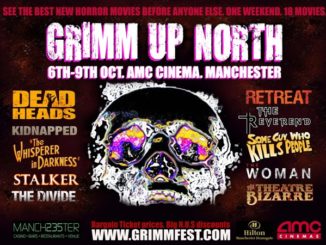
Be the first to comment